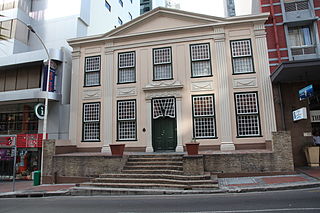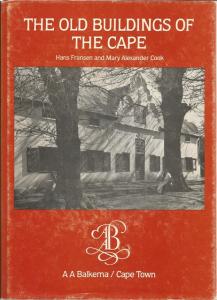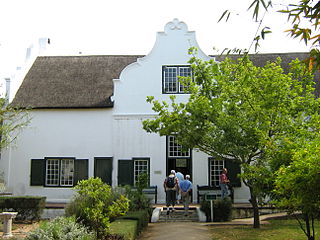
Potchefstroom, colloquially known as Potch, is an academic city in the North West Province of South Africa. It hosts the Potchefstroom Campus of the North-West University. Potchefstroom is on the Mooirivier, roughly 120 km (75 mi) west-southwest of Johannesburg and 45 km (28 mi) east-northeast of Klerksdorp.

Kirstenbosch is a botanical garden nestled at the eastern foot of Table Mountain in Cape Town. The garden is one of 10 National Botanical Gardens covering five of South Africa's six different biomes and administered by the South African National Biodiversity Institute (SANBI). Prior to 1 September 2004, the institute was known as the National Botanical Institute.

Uitenhage, officially renamed Kariega, is a South African town in the Eastern Cape Province. It is well known for the Volkswagen factory located there, which is the biggest car factory on the African continent. Along with the city of Port Elizabeth and the small town of Despatch, it forms the Nelson Mandela Bay Metropolitan Municipality.

Long Street is a major street located in the City Bowl section of Cape Town, South Africa. It is famous as a bohemian hang out and the street is lined with many book stores, various ethnic restaurants and bars. Restaurants include African restaurants such as Zula, and Indian restaurants such as Masala Dosa. Long Street exhibits a diversified culture and attracts tourists from all over the world. It also has a number of youth hostels which provide accommodation to an international roster of guests. Several theatres which showed anti-apartheid plays were located on the street during the 1970s and 1980s, although most have now closed and been replaced by restaurants or stores.

Wynberg is a southern suburb of the City of Cape Town in Western Cape, South Africa. It is situated between Plumstead and Kenilworth, and is a main transport hub for the Southern Suburbs of Cape Town.

The Castle of Good Hope is a 17th century bastion fort in Cape Town, South Africa. Originally located on the coastline of Table Bay, following land reclamation the fort is now located inland. In 1936 the Castle was declared a historical monument and following restorations in the 1980s it is considered the best preserved example of a Dutch East India Company fort.
Emmarentia is a suburb of Johannesburg, South Africa.

The Bo-Kaap is an area of Cape Town, South Africa formerly known as the Malay Quarter. It is a former racially segregated area, situated on the slopes of Signal Hill above the city centre and is a historical centre of Cape Malay culture in Cape Town. The Nurul Islam Mosque, established in 1844, is located in the area.

Gardens is an affluent inner-city suburb of Cape Town located just to the south of the city centre located in the higher elevations of the "City Bowl" and directly beneath Table Mountain and Lion's Head. It is home to several national museums such as Iziko South African National Gallery and the Iziko South African Museum. The University of Cape Town also houses its Fine Arts department in the suburb, at Michaelis School of Fine Art. Company's Garden, South Africa's oldest garden, a public park and heritage site is a focal point of the suburb. The area is also home to the oldest synagogue in Southern Africa, the Old Shul and its successor, the Gardens Shul, "The Mother Synagogue of South Africa."

Leeuwenhof is an estate in the Gardens area of Cape Town, South Africa. It is the official residence of the Premier of the Western Cape. Leeuwenhof was originally a farmhouse dating to the time of the Dutch East India Company's rule of Cape Town. It includes a Slave Quarters which has been renovated and used to house an exhibition about slavery in Cape Town. It was declared a national heritage site on 15 December 1966.

Koopmans-de Wet House is a former residence and current museum in Strand Street, Cape Town, South Africa. The house became part of the South African Museum in 1913 and was opened to the public on 10 March 1914. It was declared a National Monument under National Monuments Council legislation on 1 November 1940. It is the oldest house museum in South Africa.

The Auwal Mosque, alternatively spelled Awwal, Owal or Owwal, is a mosque in the Bo-Kaap neighbourhood of Cape Town, South Africa. It was completed in 1794 and was the first mosque established in South Africa.

George Museum is a cultural history museum located in the town of George, Western Cape, South Africa. It preserves the history of the town of George with a special focus on the timber industry. It also houses an art collection. The museum was started by Charles Sayers, in 1967 in a single room in Courtenay Street. The museum is now housed in the building the first magistrate, Adrian van Kervel built as the Drostdy (residency) from 1812 -1815.

The Old Buildings of the Cape is a book by Hans Fransen, subtitled in its latest edition A survey of extant architecture from before c. 1910 in the area of Cape Town–Calvinia–Colesberg–Uitenhage. It lists extant and lost buildings and structures in the Cape Province of South Africa. First published in 1965 and since updated, the book is a widely recognised desk reference on the subject.

Stellenbosch Museum is a cultural history museum in the centre of Stellenbosch, South Africa. It was proclaimed a museum on 23 March 1962 and is a province-aided museum which receives support from the Government of the Western Cape. The museum includes four period houses, which depict the way people lived and the difference in architectural styles over the periods illustrated. It also includes a historical powder magazine and a toy museum.

The Kerk Street Mosque, also known as the Jumah Mosque, is located in Johannesburg, South Africa.

The South African Sendinggestig Museum was established in 1977 and is currently situated in the centre of Cape Town, Western Cape, South Africa. It is a province-aided museum which receives support from the Government of the Western Cape Province.

Belmond Mount Nelson Hotel is a luxury hotel situated in the Gardens neighbourhood in inner-city Cape Town in a garden estate overlooked by Table Mountain.

The Queen Victoria Mosque, also called the Jamia Mosque, is a mosque, situated at the corner of Chiappini and Castle street, in Cape Town, South Africa. It is considered to be the first and oldest mosque in Cape Town, and the largest in the Bo-Kaap area of Cape Town. The mosque is a National heritage site.

The following outline is provided as an overview of and topical guide to Cape Town:






















